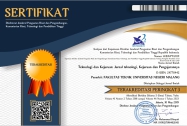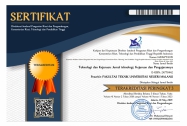Continuous Development of Knowledge Management for Higher Education Institutions
Abstract
Higher educational institutions play a very important role in gaining, improving, using, supplying, and storing knowledge and making it available for their students. For the sake of the institutions, such information needs to be managed properly and constantly. The aim of this paper is to describe how to establish effective knowledge management so that it can bring maximum benefit for all academicians. For this purpose, higher educational institutions need to know the definition of knowledge management, its structure and role model, the way of obtaining innovation from it, the use of it. Understanding all mentioned makes it easier for them to manage knowledge and come up with constant innovations through an academic research which will reveal result information, innovative ideas, and data of innovation developed. The success of knowledge management program depends on three components, human resources, the management processes, and existing technology adopted in the institutions.
Keywords
Full Text:
PDFReferences
Al-Shammari, M. (2008). Toward a knowledge management strategic framework in the Arab region. International Journal of Knowledge Management (IJKM), 4(3), 44-63. doi:10.4018/jkm.2008070104
Belfo, F. (2013). Business process management in the computer games industry. In Supply chain management: Concepts, methodologies, tools, and applications (pp. 1267-1285). Hershey, PA: IGI Global. doi:10.4018/978-1-4666-2625-6.ch075
Bennet, D. & Bennet, A. (2008). Associative patterning: The unconscious life of an organization. In J. P. Girard (Ed.), Building organizational memories: Will you know what you knew? (pp. 24-29). Hershey, PA: IGI Global.
Boni, A., & Walker, M. (2016). Universities and global human development: Theoretical and empirical insights for social change. New York: Taylor & Francis.
Chang, T.-C., & Chuang, S.-H. (2011). Performance implications of knowledge management processes: Examining the roles of infrastructure capability and business strategy. Expert Systems with Applications, 38(5), 6170-6178. doi: http://dx.doi.org/10.1016/j.eswa.2010.11.053
Davenport, T. H. (2010). Process management for knowledge work. In J. vom Brocke & M. Rosemann (eds.), Handbook on business process management 1, International handbooks on information systems (pp. 17-35). Verlag Berlin Heidelberg: Springer.
Dhamdhere, S. N. (2015). Importance of knowledge management in the higher educational institutes. Turkish Online Journal of Distance Education, 16(1), 162-183. DOI: http://dx.doi.org/10.17718/tojde.34392
Earnest, J., Joyce, A., de Mori, G., & Silvagni, G. (2010). Are universities responding to the needs of students from refugee backgrounds?. Australian Journal of Education, 54(2), 155-174. doi:10.1177/000494411005400204
Fry, H., Ketteridge, S., & Marshall, S. (2008). A handbook for teaching and learning in higher education: Enhancing academic practice. Third edition. New York: Routledge.
Goh, A. L. (2005). Fostering Innovation through knowledge-centered principles: A case analysis of Singapore Airlines. International Journal of Knowledge Management (IJKM), 1(4), 73-90. doi:10.4018/jkm.2005100104
Guetat, S., & Dakhli, S. B. D. (2010). The complementary roles of information systems and knowledge management systems: A framework based on popper’s three worlds theory. In J. E. Quintela Varajão, M. M. Cruz-Cunha, G. D. Putnik, & A. Trigo (Eds.), Enterprise information systems: International conference, CENTERIS 2010, Viana do Castelo, Portugal, October 20-22, 2010, Proceedings, Part I (pp. 374-384). Berlin, Heidelberg: Springer Berlin Heidelberg.
Gupta, J. N., Sharma, S. K., & Hsu, J. (2008). An overview of knowledge management. In M. Jennex (Ed.), Knowledge management: Concepts, methodologies, tools, and applications (pp. 1-22). Hershey, PA: IGI Global. doi:10.4018/978-1-59904-933-5.ch001
Hegazy, F. M., & Ghorab, K. E. (2014). The influence of knowledge management on organizational business processes' and employees' benefits. International Journal of Business and Social Science, 5(1), 148-172.
Howell, K. E., & Annansingh, F. (2013). Knowledge generation and sharing in UK universities: A tale of two cultures? International Journal of Information Management, 33(1), 32-39. doi: http://dx.doi.org/10.1016/j.ijinfomgt.2012.05.003
Husain, M. (2012). A significant role of knowledge management to improve the service sector industry. Prabandhan: Indian Journal of Management, 5(5), 20-28. doi:10.17010/pijom/2012/v5i5/60198
Jashapara, A. (2005). The emerging discourse of knowledge management: a new dawn for information science research?. Journal of Information Science, 31(2), 136-148. doi:10.1177/0165551505051057
Jashapara, A. (2007). Moving beyond tacit and explicit distinctions: a realist theory of organizational knowledge. Journal of Information Science, 33(6), 752-766. doi:10.1177/0165551506078404
Jurison, J. (2001). An interview with Ms. Ellen M. Knapp Vice Chairman and Global Chief Information Officer (CIO), PricewaterhouseCoopers. Journal of Global Information Technology Management, 4(1), 61-65. doi:10.1080/1097198X.2001.10856296
Kasemsap, K. (2016). Utilizing communities of practice to facilitate knowledge sharing in the digital age. In S. Buckley, G. Majewski, & A. Giannakopoulos (Eds.), Organizational knowledge facilitation through communities of practice in emerging markets (pp. 198-224). Hershey, PA: IGI Global. doi:10.4018/978-1-5225-0013-1.ch011
Kidwell, J. J., Vander Linde, K. M., & Johnson, S. L. (2000). Applying corporate knowledge management practices in higher education. EDUCAUSE QUARTERLY (EQ), 4, 28-33.
King, W. R. (2009). Knowledge management and organizational learning. LLC, US: Springer.
Michael, Z., James, M., & Satyendra, S. (2009). Knowledge management and organizational performance: an exploratory analysis. Journal of Knowledge Management, 13(6), 392-409. doi:10.1108/13673270910997088
Morgado, E. M., Ortuño, R. A., Yang, L. L., & Ferreras-Fernández, T. (2014). Adaptation of descriptive metadata for managing educational resources in the GREDOS repository. International Journal of Knowledge Management (IJKM), 10(4), 50-72. doi:10.4018/ijkm.2014100104
Muhammed, S., Doll, W. J., & Deng, X. (2011). Impact of knowledge management practices on task knowledge: An individual level study. International Journal of Knowledge Management (IJKM), 7(4), 1-21. doi:10.4018/jkm.2011100101
Nawaz, N. & Gomes, A. M. (2014). Review of knowledge management in higher education institutions. European Journal of Business and Management, 6(7), 71-79.
Nonaka, I., & Takeuchi, K. (1995). The knowledge creating company: How Japanese companies create the dynamics of innovation. Oxford: Oxford University Press.
Ojo, A. I. (2016). Knowledge management in Nigerian universities: A conceptual model. Interdisciplinary Journal of Information, Knowledge, and Management, 11, 331-345.
Omotayo, F. O. (2015). Knowledge management as an important tool in organisational management: A review of literature. Library Philosophy and Practice, 1-13. Retrieved from the EBSCO database.
Petrides, A. L., & Nodine, R. T. (2003). Knowledge management in education: Defining the landscape. Half Moon Bay, CA: Institute of the Study of Knowledge Management in Education.
Pillania, K. R. (2008). Strategic issues in knowledge management in small and medium enterprises. Knowledge Management Research & Practice, 6(4), 334-338. doi:10.1057/kmrp.2008.21
Rajak, R., & Chandra, B. (2017). A qualitative analysis on integrated approach towards teachers' burnout and work engagement in Indian HEIs. Prabandhan: Indian Journal of Management, 10(7), 24-33. doi:10.17010/pijom/2017/v10i7/116492
Ribiere, V. M., & Tuggle, F. D. (2005). The role of organizational trust in knowledge management: Tool & technology use & success. International Journal of Knowledge Management (IJKM), 1(1), 67-85. doi:10.4018/jkm.2005010104
Singer, A., & Pezone, M. (2003). Education for social change: From theory to practice. Workplace: A Journal for Academic Labor, 5(2), 1-4.
Taylor, H. (2005). A critical decision interview approach to capturing tacit knowledge: Principles and application. International Journal of Knowledge Management (IJKM), 1(3), 25-39. doi:10.4018/jkm.2005070102
Thorn, C. A. (2001). Knowledge management for educational information systems: What is the state of the field?. Educational Policy Analysis Archives, 9(47), 1-32. doi:http://dx.doi.org/10.14507/epaa.v9n47.2001
Xue, Y., Liang, H., Hauser, R., & O’Hara, M. T. (2012). An empirical study of knowledge sharing intention within virtual teams. International Journal of Knowledge Management (IJKM), 8(3), 47-61. doi:10.4018/jkm.2012070103
Yeh, Y. (2011). The implementation of knowledge management system in Taiwan’s higher education. Journal of College Teaching & Learning (TLC), 2(9), 35-42. doi:http://dx.doi.org/10.19030/tlc.v2i9.1861
Yogesh, M. (2005). Integrating knowledge management technologies in organizational business processes: getting real time enterprises to deliver real business performance. Journal of Knowledge Management, 9(1), 7-28. doi:10.1108/13673270510582938
Zoubi, D. M. (2009). Knowledge management awareness and its related operations and their impact on knowledge management utilization at Jordanian Universities. International Journal of Knowledge Management (IJKM), 5(4), 60-84. doi:10.4018/jkm.2009062904
DOI: http://dx.doi.org/10.17977/um031v42i22019p121-132
Refbacks
- There are currently no refbacks.
Copyright (c) 2020 Teknologi dan Kejuruan: Jurnal Teknologi, Kejuruan, dan Pengajarannya
Teknologi dan Kejuruan: Jurnal Teknologi, Kejuruan, dan Pengajarannya
E-ISSN 2477-0442 (online)
Contact
Faculty of Engineering, Universitas Negeri Malang (UM)
Jl. Semarang No 5 Malang 65145, Building H5, 1st Floor.
Homepage: http://journal2.um.ac.id/index.php/teknologi-kejuruan
Email: teknologikejuruan.ft@um.ac.id

This work is licensed under a Creative Commons Attribution 4.0 International License.



2.png)
1.png)
1.png)
1.png)
4.png)
1.png)
.png)

3.png)
1.png)
1.png)


